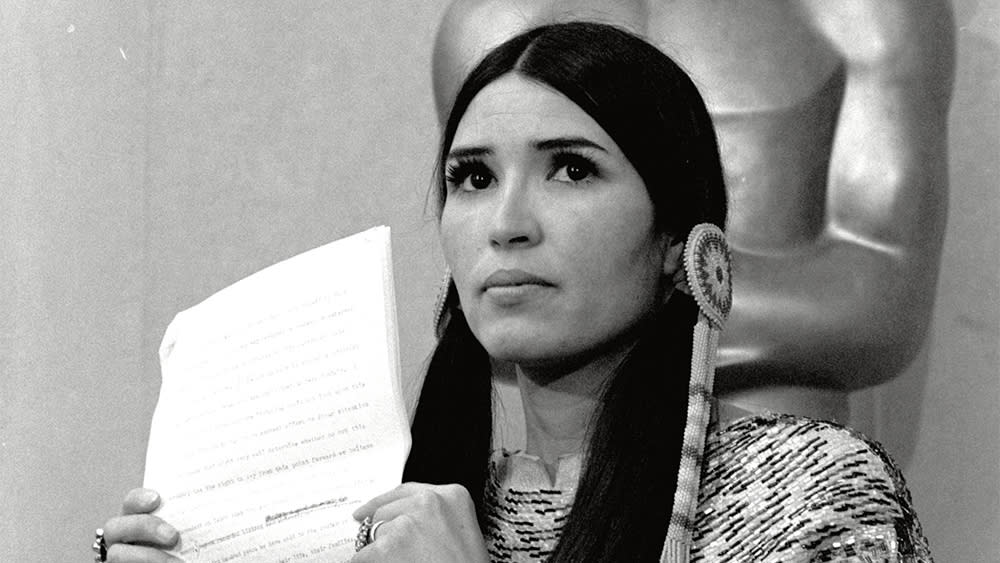Oscar and Politics Over the Decades, From Marlon Brando to Jimmy Kimmel

Political speeches have become a part of the Academy Awards in recent years, but they’re nothing new. One of the most heated back-and-forth exchanges was on April 8, 1975, when Bert Schneider and Peter Davis won for the Vietnam doc “Hearts and Minds.”
Schneider read a telegram from Viet Cong Ambassador Dinh Da Thi, offering “Greetings of friendship to the American people” and giving thanks for the U.S. war protests.
Shortly after that, Frank Sinatra stepped onstage and read a statement supposedly from the Academy of Motion Picture Arts & Sciences (but said to have been dashed off by Bob Hope backstage) saying AMPAS was not responsible for political statements and “we are sorry they had to take place this evening.” Presenter Warren Beatty walked on and muttered with a smile at Sinatra, “You old Republican, you.”
MPAA topper Jack Valenti later told Variety that winners have a right to speak out, but in general “politics should be kept out of the Academy ceremony.”
For many years, AMPAS did manage to keep a separation between politics and awards. When there were disputes, they were silent and related to industry politics.
Dudley Nichols refused to accept his Oscar for the 1935 “The Informer” due to a battle between the Academy of Motion Picture Arts & Sciences and the Screen Writers Guild, which he helped found. In those days, AMPAS represented management and the new guilds were working to establish their turf. (Nichols collected the award at the 1938 ceremony.)
Similarly, George C. Scott declined to attend the rites when he won for the 1970 “Patton,” blasting the Oscars as a “meat parade” and saying competition among actors was ridiculous.
Those were both about the entertainment industry. Jane Fonda touched on global politics by NOT talking about them. She was Oscar-nominated for her great performance in the 1971 “Klute,” at the height of her controversial anti-Vietnam war protests. People were unsure if she would win and, if she did, what would she say.
After her name was announced as best actress, Fonda thanked the Academy voters, “And thank all of you who applauded,” since not everyone did. She added, “There’s a great deal to say and I’m not going to say it tonight. I would just like to really thank you very much.” That was it.
The following year Marlon Brando made politics more overt when he won as best actor for “The Godfather.” At the March 27, 1973, ceremony, Sacheen Littlefeather read a letter from Brando, who declined to attend. In the statement, he wrote he “regretfully cannot accept this very generous award. And the reasons for this are the treatment of American Indians today by the film industry and on television.” Brando also cited the ongoing clash at Wounded Knee, where Native Americans exchanged gunfire with federal authorities for 71 days.
Littlefeather was greeted with boos and cheers from the audience.
After that memorable Oscar moment, Variety’s Thomas M. Pryor wrote a piece criticizing Brando for his “bad manners.” Pryor explained, “The question is not whether Brando had the right to criticize the government’s treatment of Indians and/or their portrayal on the screen … The point is that Brando should have had the courtesy and the courage to come on the stage before TV cameras and speak his piece himself instead of sending an emissary.”
Over the years, people got bolder. Hosts like Whoopi Goldberg addressed hot-button topics, and there were occasional political speeches from winners of docu feature and shorts.
The 75th Academy Awards were held on March 23, 2003, just a few days after the U.S. invasion of Iraq. Michael Moore won for best documentary for “Bowling for Columbine,” and touted his fellow docu-makers, saying “We like nonfiction and we live in fictitious times. We live in a time where we have fictitious election results that elect a fictitious president,” adding that George W. Bush was starting a war “for fictitious reasons. Shame on you, Mr. Bush!”
The crowd, both pro and con, went nuts.
Due to the Iraq fighting, stars like Tom Hanks and Will Smith decided to not attend the ceremony. Backstage, the war was a hot topic for journalists. Presenter Denzel Washington said, “Our hearts and our minds are elsewhere.”
Moore told the press backstage that he knew he would be criticized, but “I put America in a good light. I showed how vital it is to have free speech.”
The following day, Variety’s Elizabeth Guider described the Oscars as a “schizo show, caught uncomfortably between the celebratory and the solicitous.”
That combo of celebration and anger have continued with recent hosts such as Jon Stewart, Chris Rock and Jimmy Kimmel. And it will no doubt continue at the March 4 Oscar ceremony.
Related stories
Oscars: Republicans Warn of More 'Hollywood Liberals Blabbing About Politics'
Jimmy Kimmel on Ryan Seacrest Allegations: 'Afford People the Opportunity for Truth'
Oscars: A Season of #MeToo, Guns, Oprah Winfrey and, Oh Yeah, Awards
Subscribe to Variety Newsletters and Email Alerts!


